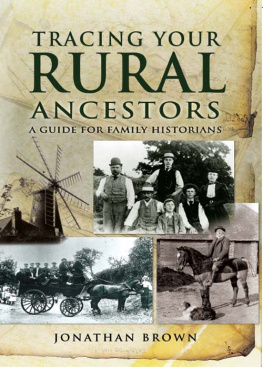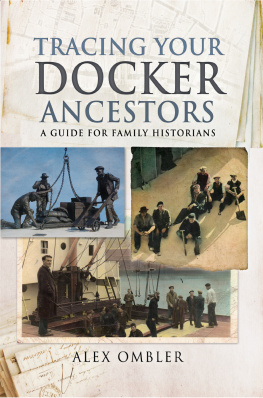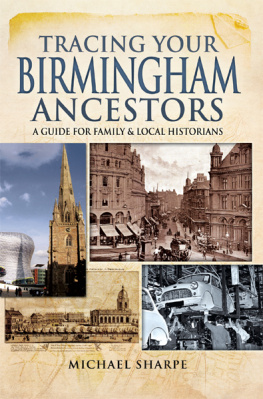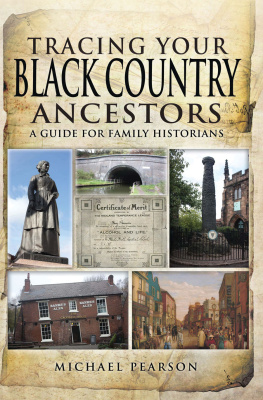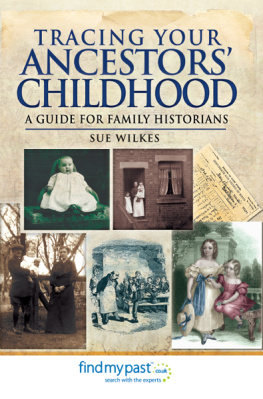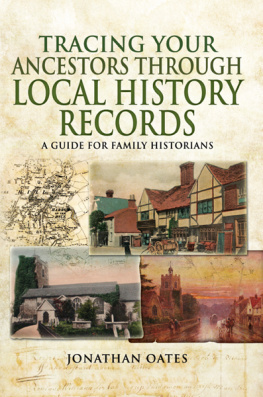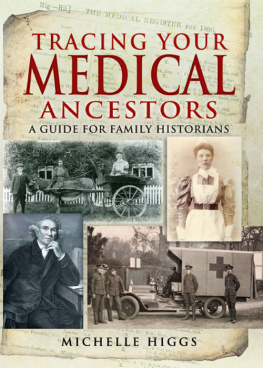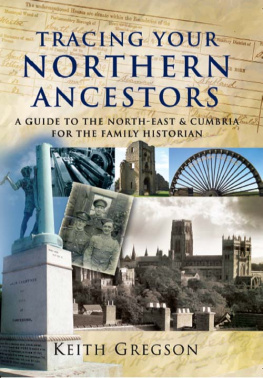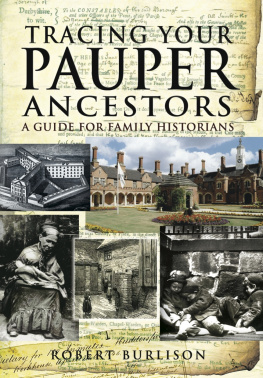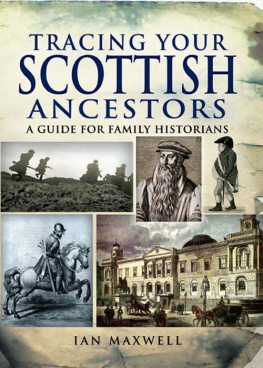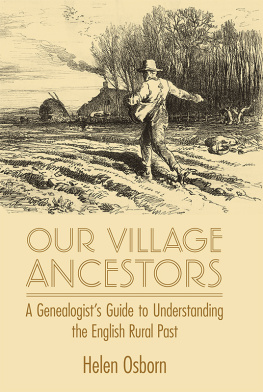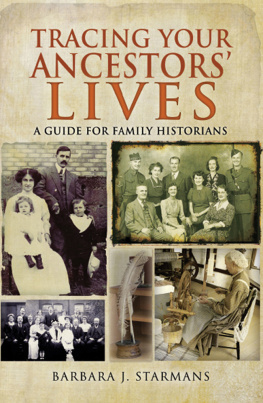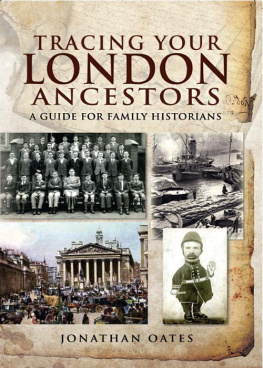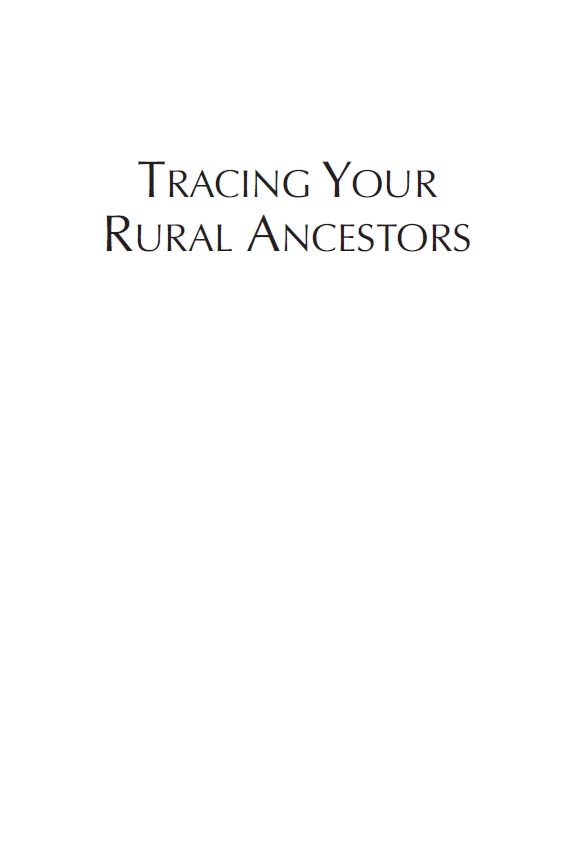
FAMILY HISTORY FROM PEN & SWORD BOOKS
Tracing Your Yorkshire Ancestors
Rachel Bellerby
Tracing Your Royal Marine Ancestors
Richard Brooks and Matthew Little
Tracing Your Pauper Ancestors
Robert Burlison
Tracing Your East End Ancestors
Jane Cox
Tracing Your Labour Movement Ancestors
Mark Crail
Tracing Your Ancestors
Simon Fowler
Tracing Your Army Ancestors
Simon Fowler
A Guide to Military History on the Internet
Simon Fowler
Tracing Your Northern Ancestors
Keith Gregson
Your Irish Ancestors
Ian Maxwell
Tracing Your Northern Irish Ancestors
Ian Maxwell
Tracing Your Scottish Ancestors
Ian Maxwell
Tracing Your London Ancestors
Jonathan Oates
Tracing Family History on the Internet
Christopher Patton
Tracing Your Air Force Ancestors
Phil Tomaselli
Tracing Your Secret Service Ancestors
Phil Tomaselli
Tracing Your Criminal Ancestors
Stephen Wade
Tracing Your Legal Ancestors
Stephen Wade
Tracing Your Police Ancestors
Stephen Wade
Tracing Your Jewish Ancestors
Rosemary Wenzerul
Fishing and Fishermen
Martin Wilcox
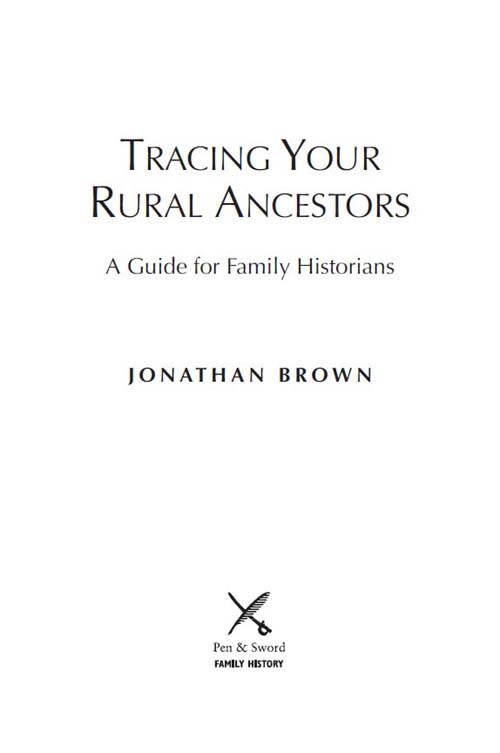
First published in Great Britain in 2011 by
PEN AND SWORD FAMILY HISTORY
an imprint of
Pen & Sword Books Ltd
47 Church Street
Barnsley
South Yorkshire
S70 2AS
Copyright Jonathan Brown 2011
ISBN 978 1 84884 227 4
Digital Edition ISBN 978 1 84468 666 7
The right of Jonathan Brown to be identified as Author of this Work has been asserted by him in accordance with the Copyright, Designs and Patents Act 1988.
A CIP catalogue record for this book is available from the British Library
All rights reserved. No part of this book may be reproduced or transmitted in any form or by any means, electronic or mechanical including photocopying, recording or by any information storage and retrieval system, without permission from the Publisher in writing.
Typeset in 10pt Palatino by Mac Style, Beverley, East Yorkshire
Printed and bound in the UK by CPI
Pen & Sword Books Ltd incorporates the Imprints of Pen & Sword Aviation, Pen & Sword Maritime, Pen & Sword Military, Wharncliffe Local History, Pen and Sword Select, Pen and Sword Military Classics, Leo Cooper, Remember When, Seaforth Publishing and Frontline Publishing.
For a complete list of Pen & Sword titles please contact
PEN & SWORD BOOKS LIMITED
47 Church Street, Barnsley, South Yorkshire, S70 2AS, England
E-mail:
Website: www.pen-and-sword.co.uk
PREFACE
M ost of us probably have rural ancestors. Often they are not that far distant: after all, half the population of England and Wales lived in the country in 1851. My father was from the first generation in his family to leave the village when, after the Second World War, he joined the Post Office telephone service. He went first to the market town. After climbing the telegraph poles in the surrounding villages for a while, he was promoted to head office in London and embarked upon a life in suburbia. His father had been a village baker, and before him there was a complement of agricultural labourers in the family.
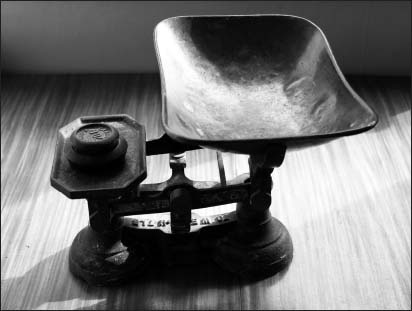
Ernest Browns (my grandfathers) scales. Made in Birmingham, of course, so nothing intrinsically rural about them. (The author)
Such stories can be replicated many times over in families across the land, and tracing something of them can be very rewarding. Frustrating as well, of course, because the trail can so quickly run cold as far as any record with names is concerned. I would be hard pushed to find anything mentioning my grandfather Ernest Brown as a baker, except probably the censuses of the time, and they have not been released yet. He is certainly not in the county directories. But I know that is what he was. Ernest told me a little about it when he was alive. I saw his bakehouse. I have ridden his delivery bike and fallen off it into a ditch. I have his scales; and I use them to weigh my flour when I make bread.
In a sense I have just been following the first rule of family history start from what we know about our families, and work out from there. And in this book I shall try to do something similar. If we have names from the census or the parish registers telling us our ancestors were farm labourers or whatever, how do we work outwards from there to the surroundings in which these people lived? So, I shall take a look at the constitution of rural society the farmers and their workers, the landowners, the village tradesmen, and the professional people to discover who they were, how they lived, and what records they might have left. The frustrations will remain, for the number of records that mention our rural forebears by name will often be small. But I hope the potential rewards will also be apparent as we discover a bit more about the lives our ancestors lived. The sky, almost, is the limit: potentially there are many avenues to explore in fleshing out the history of our family.
It will not be possible to cover everything in a volume this size. The great variety of regional and local society will of necessity be oversimplified. I shall also have to concentrate only on the village, for to look at the society of the country town in any detail would introduce too many extra paths to explore. But the links between village and market town were too intimate for the town to be completely excluded after all, many a village could once have been classed as a town, but its market declined.
In what follows, the first chapter gives a brief introduction to the structure and nature of rural society. Later chapters talk about the principal groups of people who might be found in the village, and how they might be described in the documents. These chapters will tend to work backwards from the recent past into earlier centuries, just as when constructing the story of our families. At the end of each is a brief guide to some of the sources in which records of these people can be found. gives some guidance on where and how to get access to the books and documents. The bibliography offers suggestions for further reading to cover most interests, including books that range from introductory texts to the more detailed and academic.
Many people have contributed to the making of this book unknowingly, over the time long before my colleague Guy Baxter put the project in my in tray. They include those who have sent me their enquiries relating to their own family research. In answering them their concerns seeped into my thinking. The members of family history and local history groups, and continuing education classes, to whom I have given talks from time to time, have all helped through their questions and responses in the composition of this book. My thanks go to all of these, but one special word must be for my former work colleague Christine Croker. I have listened over a number of years to the tales of her quest for rural ancestors, which took her to the far north-east and almost the far south-west of England, and she has prompted many thoughts for this book.

